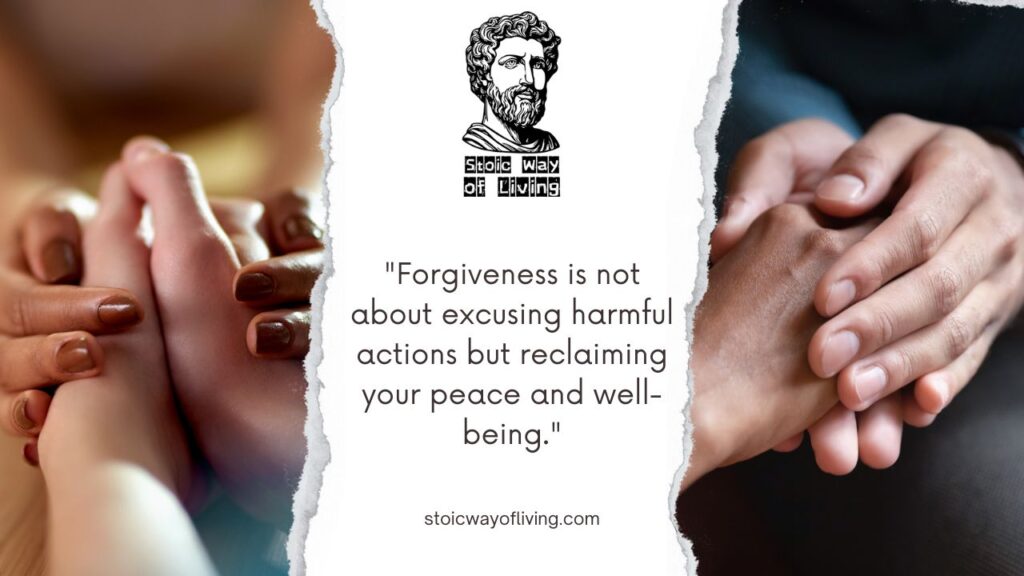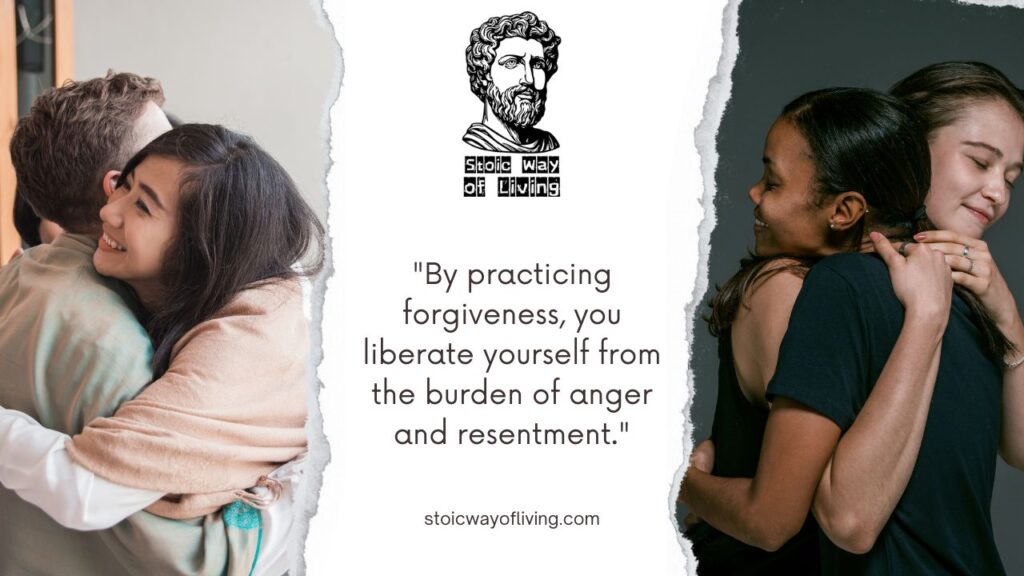Practicing forgiveness is freeing yourself from the burden of anger and resentment. It’s not about excusing harmful actions but reclaiming your peace and well-being.
This article explores the Stoic perspective on forgiveness, its health benefits, and practical steps to cultivate it daily. Stay tuned!
Understanding Forgiveness in Stoicism

Stoicism, an ancient philosophy, offers profound insights into leading a life of virtue and tranquility.
At its core, Stoicism teaches the importance of distinguishing between what we can control and what we cannot.
In Stoicism, forgiveness is not about excusing harmful actions but freeing oneself from anger and resentment.
It involves recognizing that everyone, including ourselves, makes mistakes due to ignorance or external influences.
Fundamental Stoic principles such as control, perspective, and virtue play a vital role in this process.
Epictetus emphasized focusing on our responses rather than external events, while Marcus Aurelius advised viewing wrongdoers as part of a shared human experience.
By practicing forgiveness, we exercise virtue and maintain our inner peace, regardless of others’ actions.
The Health Benefits of Forgiveness

Forgiveness offers significant mental and physical health benefits.
Mentally, it reduces stress, anxiety, and depression, fostering emotional well-being and a more optimistic outlook.
Physically, forgiveness lowers stress levels, which enhances the immune system and reduces inflammation, thereby preventing illnesses like heart disease and cognitive decline.
Forgiving others strengthens relationships, promoting empathy, understanding, and better communication.
By letting go of grudges, we create healthier, more fulfilling connections with those around us, enhancing our overall quality of life.
The Stoic Process of Forgiveness
The Stoic process of forgiveness involves four crucial steps: Responsibility, Remorse, Restoration, and Renewal.
First, we must take responsibility for our actions and reactions, practicing self-compassion.
Next, we allow ourselves to feel remorse, using it as a catalyst for personal growth rather than dwelling on guilt.
Restoration involves sincerely apologizing for our part in the conflict and communicating our feelings openly.
Finally, renewal requires us to move forward without resentment, committing to an open heart and mind.
This process not only heals relationships but also fosters personal resilience and growth.
Practicing Forgiveness in Everyday Life
Forgiveness is fundamentally about freeing your mind and heart from the negative emotions that bind you to past hurts and grievances.
By incorporating the following practices into your daily life, you can cultivate forgiveness more effectively, leading to a more peaceful, resilient, and fulfilling existence.
Acknowledge the Situation
Start by honestly acknowledging the conflict or hurt. Reflect on what happened, your role, and how it made you feel.
Find a quiet space to sit and take deep breaths, calming your mind and allowing yourself to process the situation.
Everyday Action: Take five minutes each day to meditate or journal about any conflicts or negative emotions you’re experiencing. This helps in understanding and addressing them promptly.
Name Your Feelings and Practice Self-Compassion
Identify your emotions using tools like a feelings wheel to pinpoint your feelings.
Acknowledge these emotions without judgment, and remind yourself that feeling hurt or upset is okay.
Everyday Action: When feeling overwhelmed, take a moment to pause and name your emotions. Tell yourself it’s okay to feel this way and that you’re doing your best.
Let It Out
Bottling up emotions can lead to prolonged stress and resentment.
Find a healthy way to express your feelings, whether through writing in a journal, talking to a trusted friend, or engaging in physical activity like running or yoga.
Everyday Action: Keep a journal and write your thoughts and feelings daily. Alternatively, go for a walk or exercise to release pent-up emotions physically.
Establish Clear Boundaries
Forgiving doesn’t mean allowing harmful behavior to continue.
Set clear boundaries to protect your mental and emotional well-being.
Communicate your needs and limits to others.
Everyday Action: Practice saying “no” when necessary and communicate your boundaries in personal and professional relationships.
Lean into Empathy
Try to understand the other person’s perspective.
This doesn’t mean excusing their behavior, but seeing the situation from their point of view can help reduce your anger and hurt.
Everyday Action: When someone upsets you, pause and consider what might be happening in their life that led to their actions. This can foster empathy and reduce immediate frustration.
Communicate to Create Closure
If appropriate, have an open and honest conversation with the person who hurt you.
Express your feelings calmly and listen to their perspective. This can help create closure and mutual understanding.
Everyday Action: Practice active listening and clear communication in your daily interactions. If you feel hurt, address it calmly and constructively rather than letting it fester.
Seek Support
Don’t hesitate to reach out for support.
Talk to friends, family, or a mental health professional who can provide guidance and understanding as you work through your emotions.
Everyday Action: Schedule regular check-ins with a friend or therapist to discuss your feelings and gain perspective and support.
Find the Lesson and Reclaim Your Power
Look for the lessons in the conflict. What can you learn from the situation that will help you grow?
Use this knowledge to empower yourself and move forward with greater wisdom.
Everyday Action: After reflecting on a conflict, write down one positive lesson or insight you gained from the experience. This helps reframe your perspective and turn challenges into growth opportunities.
See also: Handling Conflicts with Stoic Calmness – What You Need to Do!
Conclusion
Practicing forgiveness from a Stoic perspective involves recognizing our shared humanity, focusing on what we can control, and letting go of resentment.
By embracing forgiveness, we liberate ourselves from the negative emotions that hold us back, fostering inner peace and resilience. This practice transforms our lives and relationships, allowing us to live more empathetically and lovingly.
Let forgiveness be a daily commitment, helping us achieve a harmonious and fulfilling existence.
If you want to delve deeper into forgiveness and its impact on your life, consider reading “Practicing Forgiveness: A Path Toward Healing” by Richard S. Balkin. This highly-rated book explores a model for forgiveness that can help repair relationships or promote self-healing when reconciliation isn’t possible. Check it out on Amazon!


